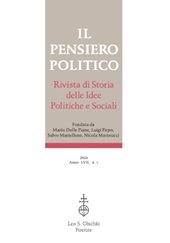Roberto Michels e il fascismo : culto dell'eroe e dittatura carismatica
P. 35-53
The sociological concept of charisma is often seen as crucial to understanding Robert Michels' alignment with fascism. However, while Michels did draw on Max Weber's theory of charisma, his interpretation involved significant simplification. Rather than engaging with Weber's complex sociological framework, Michels developed a theory of charismatic leadership based on Benito Mussolini as an ideal type. Furthermore, little attention has been paid to the fact that Michels did not adopt the concept of charisma straight away. Originally influenced by authors such as Thomas Carlyle and Gustave Le Bon, he initially characterized Mussolini as a "hero".
Only in 1927 did he finally incorporate charisma into his thinking, thus integrating and modifying the "hero-label". By examining Michels' writings on fascism from 1921 to 1936, this paper addresses the relationship between hero worship and charisma in his thinking. In particular, it investigates how Mussolini's affirmation as the ‘Duce' of fascism led Michels to expand his analytical framework beyond the scope of his Soziologie des Parteiwesens, initiating an intellectual transformation that was to culminate in his Corso di sociologia politica and in his last writings. [k.w.: Robert Michels, Max Weber, charisma, leadership, fascism] [Publisher's text]
-
Articles from the same issue (available individually)
-
Information
DOI: 10.1400/299877
ISSN: 2035-7958
DISCIPLINES


